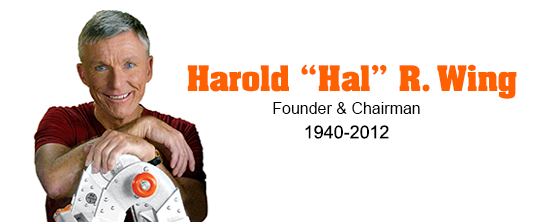The news may seem to be filled with stories of business people with no morals. This, however, is a different kind of story (and I suggest that the world is just as full of this kind of story as the other, they just don't get the same kind of press partly because people seem to seek justice more than they wish to recognize honor). This is the story of my brush with Mr. Harold "Hal" R. Wing.
Just over nine months ago, I had the privilege of meeting Hal Wing. We had arranged for his presentation to a group of about 90 people eager to learn about entrepreneurship. Mr. Wing did not disappoint. He arrived early - probably because there's a lot of open road here and, yes, he was in one of his famously fast sports car (a Porsche to be exact)! He set up for the "show." I had only asked him to come talk about entrepreneurship, bit it was indeed a show. Both inspirational and impressive.
Mid-way through his presentation he climbed to the top of a Little Giant ladder and demonstrated how he had yodeled his way to success (he really did yodel from a ladder in the early days in retail demo areas to garner the attention of the crowd - but that's a story for another time). Latter, he declined to have lunch because he didn't eat lunch - hadn't done so for years. Said that in the early days he became accustomed to living in his car, working hard, pinching pennies and simply ate one meal per day and spent the rest of the day selling his ladders. That one-meal-a-day thing stuck (and that one meal is apparently not lunch).
I found myself wondering, exactly what kind of guy is this? Doesn't eat lunch. And, here he is, in his seventies and yodeling atop a ladder in an entrepreneurship presentation. As I thought about it, I realized this is a man of great integrity. He adheres to what he believes. He teaches by being, not just by saying (thus he was atop a ladder). He didn't say, be energetic, he was energetic.
To me, integrity is truly making one's actions consistent with one's beliefs. It takes real discipline. It is a virtue.
I believe integrity had been his way from the very beginning and point to this evidence as published in CNN Money. After starting and growing a company that was grossing well over $1 million per year, Mr. Wing, experienced a reversal of fortune. The article states:
Just over nine months ago, I had the privilege of meeting Hal Wing. We had arranged for his presentation to a group of about 90 people eager to learn about entrepreneurship. Mr. Wing did not disappoint. He arrived early - probably because there's a lot of open road here and, yes, he was in one of his famously fast sports car (a Porsche to be exact)! He set up for the "show." I had only asked him to come talk about entrepreneurship, bit it was indeed a show. Both inspirational and impressive.
Mid-way through his presentation he climbed to the top of a Little Giant ladder and demonstrated how he had yodeled his way to success (he really did yodel from a ladder in the early days in retail demo areas to garner the attention of the crowd - but that's a story for another time). Latter, he declined to have lunch because he didn't eat lunch - hadn't done so for years. Said that in the early days he became accustomed to living in his car, working hard, pinching pennies and simply ate one meal per day and spent the rest of the day selling his ladders. That one-meal-a-day thing stuck (and that one meal is apparently not lunch).
I found myself wondering, exactly what kind of guy is this? Doesn't eat lunch. And, here he is, in his seventies and yodeling atop a ladder in an entrepreneurship presentation. As I thought about it, I realized this is a man of great integrity. He adheres to what he believes. He teaches by being, not just by saying (thus he was atop a ladder). He didn't say, be energetic, he was energetic.
To me, integrity is truly making one's actions consistent with one's beliefs. It takes real discipline. It is a virtue.
I believe integrity had been his way from the very beginning and point to this evidence as published in CNN Money. After starting and growing a company that was grossing well over $1 million per year, Mr. Wing, experienced a reversal of fortune. The article states:
| Raising seven kids, Hal was a little strapped for cash and he sold a stake in the company to two partners in 1981. "They said they would bring in $335,000, but they only invested $87,000 at 10 percent interest," he says. Five years later, after they sold control to a conglomerate ... which was buying up small companies and raiding their lines of credit, the company went under. Hal walked away with little to show for years of hard work. In March 1986, Little Giant's assets went on the block at a Sheriff's sale. Hal bought it back, getting financing from a bank on the strength of his word. Then he went to every supplier that Little Giant owed and told them if they'd work with him, he would pay everything back, a total of $1.8 million. "He didn't have to do that," ... "He only bought the company's assets, not liabilities." Hal paid off the debts and grew sales at double-digit rates. By 2003, he had a nice, steady $20 million a year company. (Source: Christie, Les. "Little giant ladders stretch out." CNNMoney on the Web 15 Oct. 2006.) |
Of course, the company Mr. Wing started (and then restarted) has grown to be worth much more than that today.
So, I pay tribute to Mr. Wing. He passed away earlier this month, August 6, 2012. May he rest in peace.
So, I pay tribute to Mr. Wing. He passed away earlier this month, August 6, 2012. May he rest in peace.



 RSS Feed
RSS Feed

